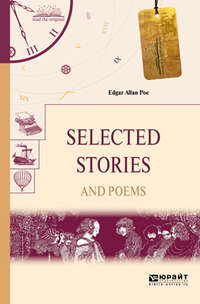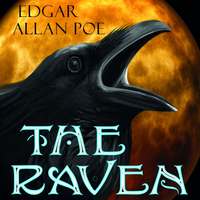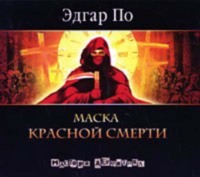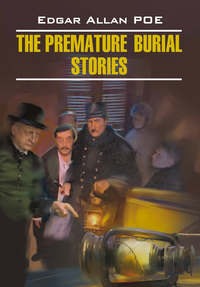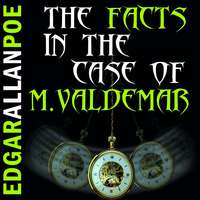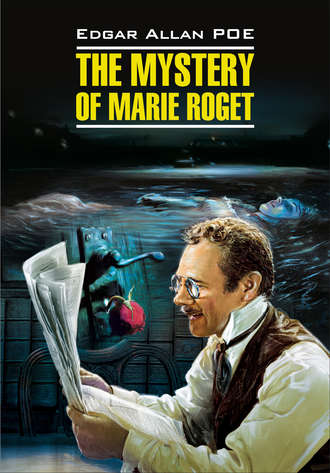
Полная версия
The Mystery of Marie Roget. Stories / Тайна Мари Роже. Рассказы. Книга для чтения на английском языке
“Giving the lambda a fillip with my finger, I turned it upside down. So the sentence now read ‘o nous estin augos’, and is, you perceive, the fundamental doctrines in his metaphysics.”
“Were you ever at Rome?” asked the restaurateur, as he finished his second bottle of Mousseux, and drew from the closet a larger supply of Chambertin.
“But once, Monsieur Bon-Bon, but once. There was a time,” said the devil, as if reciting some passage from a book – “there was a time when occurred an anarchy of five years, during which the republic, bereft of all its officers, had no magistracy besides the tribunes of the people, and these were not legally vested with any degree of executive power – at that time, Monsieur Bon-Bon – at that time only I was in Rome, and I have no earthly acquaintance, consequently, with any of its philosophy.”[24]
“What do you think of – what do you think of – hiccup! – Epicurus[25]?”
“What do I think of whom?” said the devil, in astonishment, “you cannot surely mean to find any fault with Epicurus! What do I think of Epicurus! Do you mean me, sir? – I am Epicurus! I am the same philosopher who wrote each of the three hundred treatises commemorated by Diogenes Laertes[26].”
“That’s a lie!” said the metaphysician, for the wine had gotten a little into his head.
“Very well! – very well, sir! – very well, indeed, sir!” said his Majesty, apparently much flattered.
“That’s a lie!” repeated the restaurateur, dogmatically; “that’s a – hiccup! – a lie!”
“Well, well, have it your own way[27]!” said the devil, pacifically, and Bon-Bon, having beaten his Majesty at argument, thought it his duty to conclude a second bottle of Chambertin.
“As I was saying,” resumed the visiter – “as I was observing a little while ago, there are some very outré notions in that book of yours, Monsieur Bon-Bon. What, for instance, do you mean by all that humbug about the soul? Pray, sir, what is the soul?”
“The – hiccup! – soul,” replied the metaphysician, referring to his MS.[28], “is undoubtedly —”
“No, sir!”
“Indubitably —”
“No, sir!”
“Indisputably —”
“No, sir!”
“Evidently —”
“No, sir!”
“Incontrovertibly —”
“No, sir!”
“Hiccup! —”
“No, sir!”
“And beyond all question, a —”
“No sir, the soul is no such thing!” (Here the philosopher, looking daggers[29], took occasion to make an end, upon the spot, of his third bottle of Chambertin.)
“Then – hic-cup! – pray, sir – what – what is it?”
“That is neither here nor there[30], Monsieur Bon-Bon,” replied his Majesty, musingly. “I have tasted – that is to say, I have known some very bad souls, and some too – pretty good ones.” Here he smacked his lips, and, having unconsciously let fall his hand upon the volume in his pocket, was seized with a violent fit of sneezing.
He continued.
“There was the soul of Cratinus – passable: Aristophanes – racy: Plato – exquisite – not your Plato, but Plato the comic poet; your Plato would have turned the stomach of Cerberus – faugh! Then let me see! there were Naevius, and Andronicusand Plautus, and Terentius. Then there were Lucilius, and Catullus, and Naso, and Quintus Flaccus[31], – dear Quinty! as I called him when he sung a seculare for my amusement, while I toasted him, in pure good humor, on a fork. But they want flavor, these Romans. One fat Greek is worth a dozen of them, and besides will keep, which cannot be said of a Quirite[32]. – Let us taste your Sauterne.”
Bon-Bon had by this time made up his mind to nil admirari[33] and endeavored to hand down the bottles in question. He was, however, conscious of a strange sound in the room like the wagging of a tail. Of this, although extremely indecent in his Majesty, the philosopher took no notice: – simply kicking the dog, and requesting him to be quiet. The visiter continued:
“I found that Horace tasted very much like Aristotle; – you know I am fond of variety. Terentius I could not have told from Menander. Naso, to my astonishment, was Nicander in disguise. Virgilius had a strong twang of Theocritus. Martial put me much in mind of Archilochus – and Titus Livius was positively Polybius[34] and none other.”
“Hic-cup!” here replied Bon-Bon, and his majesty proceeded:
“But if I have a penchant, Monsieur Bon-Bon – if I have a penchant, it is for a philosopher. Yet, let me tell you, sir, it is not every dev – I mean it is not every gentleman who knows how to choose a philosopher. Long ones are not good; and the best, if not carefully shelled, are apt to be a little rancid on account of the gall!”
“Shelled!”
“I mean taken out of the carcass.”
“What do you think of a – hic-cup! – physician?”
“Don’t mention them! – ugh! ugh! ugh!” (Here his Majesty retched violently.) “I never tasted but one – that rascal Hippocrates! – smelt of asafoetida – ugh! ugh! ugh! – caught a wretched cold washing him in the Styx – and after all he gave me the cholera morbus[35].”
“The – hiccup – wretch!” ejaculated Bon-Bon, “the – hic-cup! – absorption of a pill-box!” – and the philosopher dropped a tear.
“After all,” continued the visitor, “after all, if a dev – if a gentleman wishes to live, he must have more talents than one or two; and with us a fat face is an evidence of diplomacy.”
“How so?”
“Why, we are sometimes exceedingly pushed for provisions. You must know that, in a climate so sultry as mine, it is frequently impossible to keep a spirit alive for more than two or three hours; and after death, unless pickled immediately (and a pickled spirit is not good), they will – smell – you understand, eh? Putrefaction is always to be apprehended when the souls are consigned to us in the usual way.”
“Hiccup! – hiccup! – good God! how do you manage?”
Here the iron lamp commenced swinging with redoubled violence, and the devil half started from his seat; – however, with a slight sigh, he recovered his composure, merely saying to our hero in a low tone: “I tell you what[36], Pierre Bon-Bon, we must have no more swearing.”
The host swallowed another bumper, by way of denoting thorough comprehension and acquiescence, and the visitor continued.
“Why, there are several ways of managing. The most of us starve: some put up with the pickle: for my part I purchase my spirits vivente corpore[37], in which case I find they keep very well.”
“But the body! – hiccup! – the body!”
“The body, the body – well, what of the body? – oh! ah! I perceive. Why, sir, the body is not at all affected by the transaction. I have made innumerable purchases of the kind in my day, and the parties never experienced any inconvenience. There were Cain and Nimrod, and Nero, and Caligula, and Dionysius, and Pisistratus, and – and a thousand others, who never knew what it was to have a soul during the latter part of their lives; yet, sir, these men adorned society. Why possession of his faculties, mental and corporeal? Who writes a keener epigram? Who reasons more wittily? Who – but stay! I have his agreement in my pocket-book.”
Thus saying, he produced a red leather wallet, and took from it a number of papers. Upon some of these Bon-Bon caught a glimpse of the letters Machi – Maza – Robesp – with the words Caligula, George, Elizabeth. His Majesty selected a narrow slip of parchment, and from it read aloud the following words:
“In consideration of certain mental endowments which it is unnecessary to specify, and in further consideration of one thousand louis d’or, I being aged one year and one month, do hereby make over to the bearer of this agreement all my right, title, and appurtenance in the shadow called my soul. (Signed) A…”[38] (Here His Majesty repeated a name which I did not feel justified in indicating more unequivocally.)
“A clever fellow that,” resumed he; “but like you, Monsieur Bon-Bon, he was mistaken about the soul. The soul a shadow, truly! The soul a shadow; Ha! ha! ha! – he! he! he! – hu! hu! hu! Only think of a fricasséed shadow!”
“Only think – hiccup! – of a fricasséed shadow!” exclaimed our hero, whose faculties were becoming much illuminated by the profundity of his Majesty’s discourse.
“Only think of a – hiccup! – fricasséed shadow!! Now, damme! – hiccup! – humph! If I would have been such a – hiccup! – nincompoop! My soul, Mr. – humph!”
“Your soul, Monsieur Bon-Bon?”
“Yes, sir – hiccup! – my soul is —”
“What, sir?”
“No shadow, damme!”
“Did you mean to say —”
“Yes, sir, my soul is – hiccup! – humph! – yes, sir.”
“Did you not intend to assert —”
“My soul is – hiccup! – peculiarly qualified for – hiccup! – a —”
“What, sir?”
“Stew.”
“Ha!”
“Souflée.”
“Eh!”
“Fricassée.”
“Indeed!”
“Ragout and fricandeau – and see here, my good fellow! I’ll let you have it – hiccup! – a bargain.” Here the philosopher slapped his Majesty upon the back.
“Couldn’t think of such a thing[39],” said the latter calmly, at the same time rising from his seat. The metaphysician stared.
“Am supplied at present,” said his Majesty.
“Hiccup – e-h?” said the philosopher.
“Have no funds on hand.”
“What?”
“Besides, very unhandsome in me —”
“Sir!”
“To take advantage of —”
“Hiccup!”
“Your present disgusting and ungentlemanly situation.”
Here the visitor bowed and withdrew – in what manner could not precisely be ascertained – but in a well-concerted effort to discharge a bottle at “the villain,” the slender chain was severed that depended from the ceiling, and the metaphysician prostrated by the downfall of the lamp.
Morella
Αυτό χατ ‘αυτά μετ’ αύτοϋ μονοειδές α’ιεί φν
Plato. Sympos[40]April 1835
With a feeling of deep but most singular affection I regarded my friend Morella. Thrown by accident into her society many years ago, my soul, from our first meeting, burned with fires it had never known – but the fires were not of Eros – and bitter and tormenting to my eager spirit was the gradual conviction that I could in no manner define their unusual meaning, or regulate their vague intensity. Yet we met: and Fate bound us together at the altar: and I never spoke of love, or thought of passion. She, however, shunned society, and, attaching herself to me alone, rendered me happy. It is a happiness to wonder. It is a happiness to dream.
Morella’s erudition was profound. As I hope to live, her talents were of no common order – her powers of mind were gigantic. I felt this, and in many matters became her pupil. I soon, however, found that Morella, perhaps on account of her Presburg education, laid before me a number of those mystical writings which are usually considered the mere dross of the early German literature. These, for what reasons I could not imagine, were her favorite and constant study: and that in process of time they became my own, should be attributed to the simple but effectual influence of habit and example.
In all this, if I err not[41], my reason had little to do. My convictions, or I forget myself, were in no manner acted upon by my imagination, nor was any tincture of the mysticism which I read, to be discovered, unless I am greatly mistaken, either in my deeds or in my thoughts. Feeling deeply persuaded of this I abandoned myself more implicitly to the guidance of my wife, and entered with a bolder spirit into the intricacy of her studies. And then – then, when poring over forbidden pages I felt the spirit kindle within me, would Morella place her cold hand upon my own, and rake up from the ashes of a dead philosophy some low singular words, whose strange meaning burnt themselves in upon my memory: and then hour after hour would I linger by her side, and dwell upon the music of her thrilling voice, until at length its melody was tinged with terror and fell like a shadow upon my soul, and I grew pale, and shuddered inwardly at those too unearthly tones – and thus Joy suddenly faded into Horror, and the most beautiful became the most hideous, as Hinnon became Ge-Henna.
It is unnecessary to state the exact character of these disquisitions, which, growing out of the volumes I have mentioned, formed, for so long a time, almost the sole conversation of Morella and myself. By the learned in what might be termed theological morality they will be readily conceived, and by the unlearned they would, at all events, be little understood. The will Pantheism of Fitche[42] – the modified παλιyyεδιl[43] of the Pythagoreans – and, above all, the doctrines of Identity as urged by Schelling were generally the points of discussion presenting the most of beauty to the imaginative Morella. That Identity which is not improperly called Personal, I think Mr. Locke[44] truly defines to consist in the sameness of a rational being. And since by person we understand an intelligent essence having reason, and since there is a consciousness which always accompanies thinking, it is this which makes us all to be that which we call ourselves – thereby distinguishing us from other beings that think, and giving us our personal identity. But the Principium Individuationis – the notion of that Identity which at death is, or is not lost forever, was to me, at all times, a consideration of intense interest, not more from the mystical and exciting nature of its consequences, than from the marked and agitated manner in which Morella mentioned them.
But, indeed, the time had now arrived when the mystery of my wife’s manner oppressed me like a spell. I could no longer bear the touch of her wan fingers, nor the low tone of her musical language, nor the lustre of her melancholy eyes. And she knew all this but did not upbraid. She seemed conscious of my weakness, or my folly – and, smiling, called it Fate. She seemed also conscious of a cause, to me unknown, for the gradual alienation of my regard; but she gave me no hint or token of its nature. Yet was she woman, and pined away daily. In time the crimson spot settled steadily upon the cheek, and the blue veins upon the pale forehead became prominent: and one instant my nature melted into pity, but in the next I met the glance of her meaning eyes, and my soul sickened and became giddy with the giddiness of one who gazes downward into some dreary and fathomless abyss.
Shall I then say that I longed with an earnest and consuming desire for the moment of Morella’s decease? I did. But the fragile spirit clung to its tenement of clay for many days – for many weeks and irksome months – until my tortured nerves obtained the mastery over my mind, and I grew furious with delay, and with the heart of a fiend I cursed the days, and the hours, and the bitter moments which seemed to lengthen, and lengthen as her gentle life declined – like shadows in the dying of the day.
But one autumnal evening, when the winds lay still in Heaven, Morella called me to her side. There was a dim mist over all the earth, and a warm glow upon the waters, and amid the rich October leaves of the forest a rainbow from the firmament had surely fallen. As I came, she was murmuring in a low undertone, which trembled with fervor, the words of a Catholic hymn:
Sancta Maria! turn thine eyesUpon the sinner’s sacrificeOf fervent prayer, and humble love,From thy holy throne above. At morn, at noon, at twilight dim,Maria! thou hast heard my hymn.In joy and wo, in good and ill,Mother of God! be with me still. When my hours flew gently by.And no storms were in the sky,My soul, lest it should truant be,Thy love did guide to thine and thee. Now, when clouds of Fate o’ercastAll my Present, and my Past,Let my Future radiant shineWith sweet hopes of thee and thine.“It is a day of days” – said Morella – “a day of all days either to live or die. It is a fair day for the sons of Earth and Life – ah! more fair for the daughters of Heaven and Death.”
I turned towards her, and she continued.
“I am dying – yet shall I live. Therefore for me, Morella, thy wife, hath the charnel house no terrors – mark me! – not even the terrors of the worm. The days have never been when thou couldst love me; but her whom in life thou didst abhor, in death thou shalt adore.”
“Morella!”
“I repeat that I am dying. But within me is a pledge of that affection – ah, how little! which you felt for me, Morella. And when my spirit departs shall the child live – thy child and mine, Morella’s. But thy days shall be days of sorrow – that sorrow which is the most lasting of impressions, as the cypress is the most enduring of trees. For the hours of thy happiness are over, and Joy is not gathered twice in a life, as the roses of Paestum twice in a year. Thou shall not, then, play the Teian with Time, but, being ignorant of the myrtle and the vine, thou shalt bear about with thee thy shroud on earth, like the Moslemin at Mecca.”
“Morella!” – I cried – “Morella! how knowest thou this?” – but she turned away her face upon the pillow, and, a slight tremor coming over her limbs, she thus died, and I heard her voice no more.
Yet, as she had foreseen, her child – to which in dying she had given birth, and which breathed not till the mother breathed no more – her child, a daughter, lived. And she grew strangely in size and intellect, and was the perfect resemblance of her who had departed, and I loved her with a love more fervent and more intense than I believed it possible to feel on earth.
But ere long the Heaven of this pure affection became overcast; and Gloom, and Horror, and Grief came over it in clouds. I said the child grew strangely in stature and intelligence. Strange indeed was her rapid increase in bodily size – but terrible, oh! terrible were the tumultuous thoughts which crowded upon me while watching the development of her mental being. Could it be otherwise[45], when I daily discovered in the conceptions of the child the adult powers and faculties of the woman? – when the lessons of experience fell from the lips of infancy? and when the wisdom or the passions of maturity I found hourly gleaming from its full and speculative eye? When, I say, all this became evident to my appalled senses – when I could no longer hide it from my soul, nor throw it off from those perceptions which trembled to receive it, is it to be wondered at that suspicions of a nature fearful, and exciting, crept in upon my spirit, or that my thoughts fell back aghast upon the wild tales and thrilling theories of the entombed Morella? I snatched from the scrutiny of the world a being whom Destiny compelled me to adore, and in the rigid seclusion of my ancestral home, I watched with an agonizing anxiety over all which concerned my daughter.
And as years rolled away and daily I gazed upon her eloquent and mild and holy face, and pored orer her maturing form, did I discover new points of resemblance in the child to her mother – the melancholy, and the dead. And hourly grew darker these shadows, as it were, of similitude, and became more full, and more definite, and more perplexing, and to me more terrible in their aspect. For that her smile was like her mother’s I could bear – but then I shuddered at its too perfect identity: that her eyes were Morella’s own I could endure – but then they looked down too often into the depths of my soul with Morella’s intense and bewildering meaning. And in the contour of the high forehead, and in the ringlets of the silken hair, and in the wan fingers which buried themselves therein, and in the musical tones of her speech, and above all – oh! above all, in the phrases and expressions of the dead on the lips of the loved and the living, I found food for consuming thought and horror – for a worm that would not die.
Thus passed away two lustrums of her life, yet my daughter remained nameless upon the earth. ‘My child’ and ‘my love’ were the designations usually prompted by a father’s affection, and the rigid seclusion of her days precluded all other intercourse. Morella’s name died with her at her death. Of the mother I had never spoken to the daughter – it was impossible to speak. Indeed during the brief period of her existence the latter had received no impressions from the outward world but such as might have been afforded by the narrow limits of her privacy. But at length the ceremony of baptism presented to my mind in its unnerved and agitated condition, a present deliverance from the horrors of my destiny. And at the baptismal font I hesitated for a name. And many titles of the wise and beautiful, of antique and modern times, of my own and foreign lands, came thronging to my lips – and many, many fair titles of the gentle, and the happy and the good. What prompted me then to disturb the memory of the buried dead? What demon urged me to breathe that sound, which, in its very recollection, was wont to make ebb and flow the purple blood in tides from the temples to the heart? What fiend spoke from the recesses of my soul, when amid those dim aisles, and in the silence of the night, I shrieked within the ears of the holy man the syllables, Morella? What more than fiend convulsed the features of my child and overspread them with the hues of death, as, starting at that sound, she turned her glassy eyes from the Earth to Heaven, and falling prostrate upon the black slabs of her ancestral vault, responded “I am here!”
Distinct, coldly, calmly distinct – like a knell of death – horrible, horrible death, sank the eternal sounds within my soul. Years – years may roll away, but the memory of that epoch – never! Now was I indeed ignorant of the flowers and the vine – but the hemlock and the cypress overshadowed me night and day. And I kept no reckoning of time or place, and the stars of my Fate faded from Heaven, and, therefore, my spirit grew dark, and the figures of the earth passed by me like flitting shadows, and among them all I beheld only – Morella. The winds of the firmament breathed but one sound within my ears, and the ripples upon the sea murmured evermore – Morella. But she died, and with my own hands I bore her to the tomb, and I laughed, with a long and bitter laugh as I found no traces of the firat in the charnel where I laid the second – Morella.
William Wilson
What say of it? what say of CONSCIENCE grim, That spectre in my path?
Chamberlayne’s PharronidaOctober 1839
Let me call myself, for the present, William Wilson. The fair page now lying before me need not be sullied with my real appellation. This has been already too much an object for the scorn – for the horror – for the detestation of my race. To the uttermost regions of the globe have not the indignant winds bruited its unparalleled infamy? Oh, outcast of all outcasts most abandoned! – to the earth art thou not forever dead? to its honors, to its flowers, to its golden aspirations? – and a cloud, dense, dismal, and limitless, does it not hang eternally between thy hopes and heaven?
I would not, if I could, here or to-day, embody a record of my later years of unspeakable misery, and unpardonable crime. This epoch – these later years – took unto themselves a sudden elevation in turpitude, whose origin alone it is my present purpose to assign. Men usually grow base by degrees. From me, in an instant, all virtue dropped bodily as a mantle. From comparatively trivial wickedness I passed, with the stride of a giant, into more than the enormities of an Elah-Gabalus[46]. What chance – what one event brought this evil thing to pass, bear with me while I relate. Death approaches; and the shadow which foreruns him has thrown a softening influence over my spirit. I long, in passing through the dim valley, for the sympathy – I had nearly said for the pity – of my fellow men. I would fain have them believe that I have been, in some measure, the slave of circumstances beyond human control. I would wish them to seek out for me, in the details I am about to give, some little oasis of fatality amid a wilderness of error. I would have them allow – what they cannot refrain from allowing – that, although temptation may have erewhile existed as great, man was never thus, at least, tempted before – certainly, never thus fell. And is it therefore that he has never thus suffered? Have I not indeed been living in a dream? And am I not now dying a victim to the horror and the mystery of the wildest of all sublunary visions?
I am the descendant of a race whose imaginative and easily excitable temperament has at all times rendered them remarkable; and, in my earliest infancy, I gave evidence of having fully inherited the family character. As I advanced in years it was more strongly developed; becoming, for many reasons, a cause of serious disquietude to my friends, and of positive injury to myself. I grew self-willed, addicted to the wildest caprices, and a prey to the most ungovernable passions. Weak-minded, and beset with constitutional infirmities akin to my own, my parents could do but little[47] to check the evil propensities which distinguished me. Some feeble and ill-directed efforts resulted in complete failure on their part, and, of course, in total triumph on mine. Thenceforward my voice was a household law; and at an age when few children have abandoned their leading-strings, I was left to the guidance of my own will, and became, in all but name, the master of my own actions.






